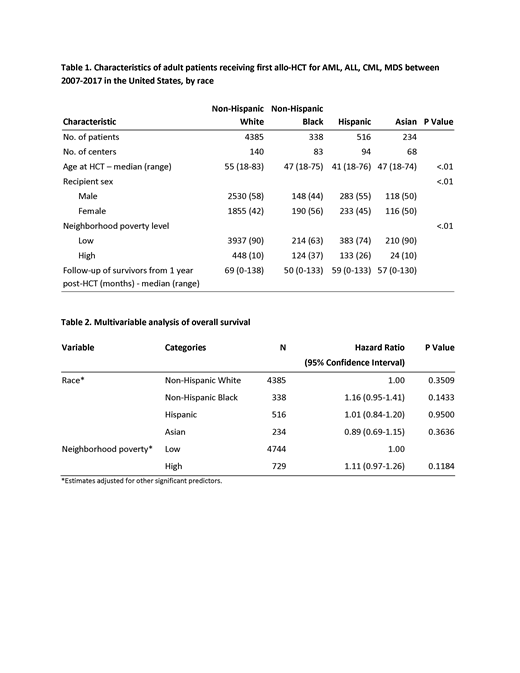Abstract
Introduction: It has been shown that racial/ethnic minorities have worse survival after matched unrelated donor allogeneic hematopoietic cell transplantation(allo-HCT) compared to Whites. Whether the racial disparity in allo-HCT outcomes persists in long-term survivors, and possibly may even be exacerbated in this population that frequently transitions back from the transplant center to their local healthcare providers, is unknown. In the current study we sought to compare long-term outcomes among one-year survivors, by race/ethnicity and socioeconomic status (SES), after allo-HCT reported to the Center for International Blood and Marrow Transplant Research (CIBMTR).
Methods: The CIBMTR database was used to identify 5,473 patients with Acute Myeloid Leukemia (AML), Acute Lymphocytic Leukemia (ALL), Chronic Myeloid Leukemia (CML), or Myelodysplastic Syndrome (MDS) who received HCT between 2007-2017, who were alive and in remission for at least 1 year after allo-HCT. Study was restricted to patients transplanted in the United States. Cox regression model was used to determine association of ethnicity/race and SES with overall survival (OS), relapse, and treatment related mortality (TRM). Standardized mortality ratio (SMR) was calculated to compare mortality rates of the study patients to their general population peers matched on race/ethnicity, age and sex.
Results: Patients were reported to be Non-Hispanic White (W) (n=4385), Non-Hispanic Black (B) (n=338), Hispanic (H) (n=516), and Asian (A) (n=234). Median follow up after 1 year allo-HCT (months): 69 W, 50 B, 59 H and 57 A (Table 1). Patient neighborhood poverty level was estimated from residential ZIP code at the time of allo-HCT. A ZIP code with ≥20% of persons below the federal poverty level was considered high poverty area. In multivariable analysis, we observed no significant differences in OS, relapse or TRM based on race or poverty level when adjusted for patient-, disease- and transplant-related covariates (Table 2).
Conclusions: Our study highlights that among those who survived at least 1-year in remission after allo-HCT, previously reported disparities in post HCT outcomes based on racial/ethnic factors, are not evident in contemporary practice. This might suggest that previously recognized disparity in outcomes could be due to factors that mostly affect patients in their first year post HCT. Future studies are needed to identify these early adverse factors and implement strategies to mitigate them.
Blue: Janssen Pharmaceuticals: Membership on an entity's Board of Directors or advisory committees; WebMD: Consultancy. Wood: Pfizer: Research Funding; Teladoc: Consultancy; Koneksa Health: Consultancy, Current equity holder in publicly-traded company. Majhail: Incyte Corporation: Consultancy; Anthem, Inc: Consultancy. Saber: Govt. COI: Other.


This feature is available to Subscribers Only
Sign In or Create an Account Close Modal